Research over the past three decades suggests that family assemblies, family councils and other governance structures help a business-owning family sustain their enterprise over multiple generations. As families become aware of the value of governance activities, they wonder how other families set up their assemblies and councils, how much they spend on governance and how the various governing bodies operate.
After a request at a recent Transitions conference, we decided to gather concrete information on how enterprising families conduct family governance. Subscribers to Family Business Magazine's newsletter were asked to complete an online survey in December 2019 and January 2020. We received 320 responses.
Of the total who completed the survey, 35% (113) report that their families have a family council, the basic unit of family governance. (See sidebar for a definition of terms used in this report.) Their responses show substantial engagement in family and business governance. Most of the data in this report are from this subset of 113 families.
Your family can use this information as a benchmark to assess your own practices, as well as to consider pathways to develop or expand the nature and extent of your family governance.
The vast majority (90%) of the 113 families with a family council have been in business for many years and continue to operate their original, legacy family business. Most are more than 40 years old:
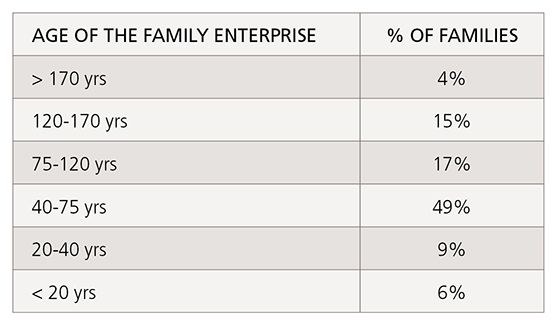
In addition to their legacy business, 35% of the families have diversified to include a family office, an entity that manages family wealth and family activities that lie outside the family business. Of this group, 30% have a single-family office; the others are affiliated with a multiÂfamily office or other investing vehicle.
Family assemblies: Convening the whole family
What is special about a family business is that the owners aren't just business partners; they're also related to each other. This connection means they share interests, values and concerns beyond business. They want to build upon and share a legacy and family identity, and to be engaged together in activities centered on more than just making money. They have philanthropic goals and ties to their hometown. They may share ownership in a vacation property. Governance is a pathway through which family members organize to fulfill their larger mission.
Having passed beyond the first generation, these families face the challenge of aligning the desires of increasing numbers of family households. The older the enterprise, the greater the number of generations involved.
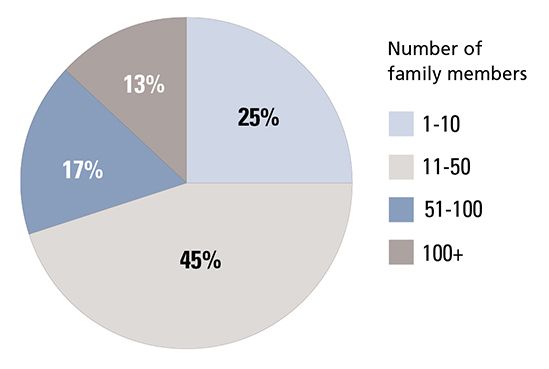
With each succeeding generation, more effort is needed to maintain family ties. Cousins are raised in separate households, perhaps located far from each other. Each household has its own interests and values. Furthermore, later-generation families are often the stewards of not one but several enterprises. Because of these complexities, family gatherings must be organized with intention and agendas.
Family governance begins with the family making a commitment to get together regularly. A gathering of the full family is called a family assembly. Most (89%) of our 113 families hold a regular family assembly. Of these, about three-quarters (74%) meet annually, and 17% gather every other year. Even families without a family council realize the merits of bringing the whole family together. More than half (56%) of the 320 people who responded to our survey said they regularly convene a full family assembly.
Getting people to attend the assembly is a continual challenge. While family members have good intentions, it is hard to clear the schedule and attend a meeting lasting several days, often at a location far from home. Despite such logistical difficulties, the assemblies are well attended. Of our core 113 families, 75% report that three-fourths or more of their family members attended the last assembly, and another 21% saw a majority of family members present.
The 113 families realize they must provide incentives and assistance to encourage people to get together. Almost all assemblies are paid for by shared family funds, rather than by individuals. More than half of these families (56%) also compensate family members for travel to family gatherings. Young adults have particular challenges: young children and lack of available cash. To overcome this difficulty, 48% of the families report that they pay for babysitting during meetings.
Whole-family assemblies are more than social gatherings. They combine fun, education, quality family time and business meetings. They offer family members of each generation a place to get to know each other, strengthen their bonds and catch up on what's happening in their lives, in addition to conducting family business.
Families reported many activities taking place at the family assembly:
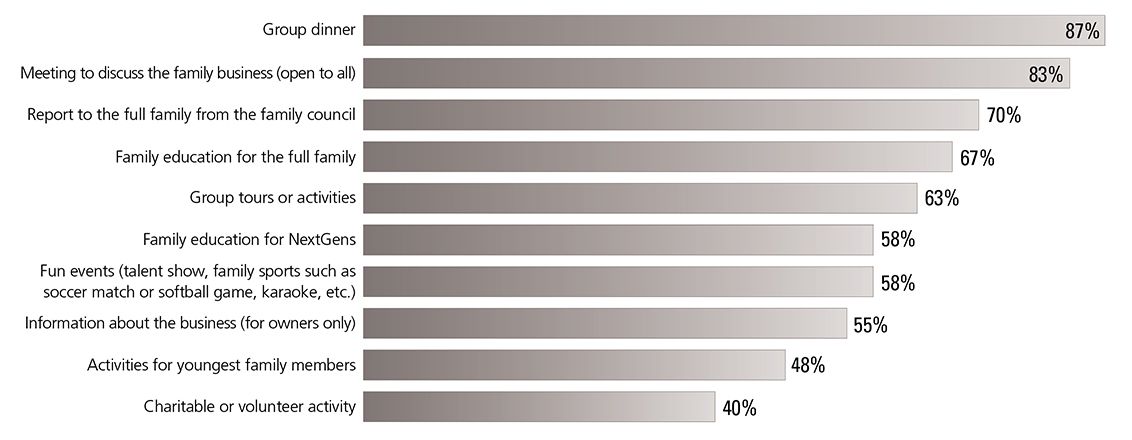
Family education. One of the most important shared family activities is an educational program for younger family members. Given their wealth and resources — which might include not just a business, but also a foundation, investments, a family office and real estate — family members who will inherit ownership have a responsibility to be stewards of the wealth. The families want to teach responsible behavior to their children. They must learn things that are not taught in school.
Nearly half (48%) of the families report having a formal family education program. Of these families, 58% have separate programs for different age groups. Families offered many examples of topics covered in these programs (see accompanying list).
The families also encourage young family members to attend business programs in the community and at business schools. They offer support for education in degree and non-degree executive education programs. The families value education, and they want an educated rising generation to sustain their family and business focus.
Family communication networks
Assemblies and other family gatherings strengthen bonds among family members and develop shared interests. However, families also must sustain and build on these relationships and activities by staying in communication between meetings. Many families have created family portals and social media connections. These personal networks offer privacy and security for confidential family sharing, as well as informal and personal channels for families to keep in touch and move activities forward.
• 41% of the 113 families have an intranet or dedicated family web portal.
• 31% have a print or electronic family newsletter.
The larger the family, the more communication tools they use regularly:
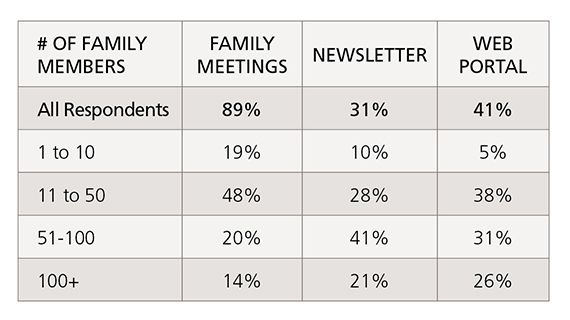
One anomaly in this data is that the largest families appear to be less likely to use these tools. It may be that larger families have more difficulty creating shared commitment and deep personal bonds. They may find it more effective to conduct family communication through liaisons who represent branches or geographic regions.
Some families hold generational or shared-interest meetings, which bring together members of each generation with common concerns or talents. These meetings can be an exciting and meaningful bonding, learning and planning opportunity for young family members. For example, in one family, the third generation meets monthly for educational programs contracted through a local non-profit organization.
The family council
When a second- or third-generation family has expanded to contain more family members than can sit around a table, someone must coordinate activities. In the early years of a business when the family is smaller, the founding generation or family business leaders take charge of these tasks by default. When there is a larger stakeholder group, overseeing family ownership of the business becomes more complex, and a team of people is needed to manage the workload. Hence, a multigenerational family enterprise creates what is commonly known as a family council. The council is the executive group that coordinates activities such as organizing the family gathering, keeping people in touch, and developing family education and philanthropy.
In addition to organizing activities, the family council is responsible for governance, such as setting policies to manage complexity (like the family employment policy) and creating the family constitution. Many families have a board of directors and a governance structure for their business. But the desire of the family to strengthen relationships; celebrate the family legacy; and develop skills, knowledge and commitment for the future means they must engage in family activities that lie outside the business (even though some of them have an impact on the business). The business structures and the business leader, who faces many other challenges, cannot take on these tasks. So we see families creating the family council as a parallel structure to the business: a family organization that takes on the task of organizing, growing and developing the family.
The council does not operate like a business board. While the business organization has strict rules for decision rights, the family is a voluntary organization. Family members have to decide to be part of it, and the organization of the council reflects this voluntary nature. The council often decides by consensus and is by nature a collaborative organization. When policies and rules are established, the family must be part of the decision, or family members simply will not abide by them. Creating a family council reflects a move by the family to a collaborative, engaged and democratic structure. These collaborative values often influence business governance.
A family council represents all members of the family, not just the elders or owners. It's important for families to make sure council members reach out to all stakeholder groups that make up the family, such as younger generations and family branches. Councils also face the challenge of integrating newly married-in family members into the family and encouraging their new energy and ideas, so that these newcomers feel they are really part of the family (and therefore want to attend the gatherings and bring their children).
Selecting council members. Family members realize that council membership should not be honorary; an effective council requires real work.
Families want their council to represent the family in all its diversity. When a family is small, the whole family can serve on the council. But by the second generation, the family is often identified by second-generation family branches. Branches often represent shared ownership entities like trusts, so there is a natural tendency to select members to represent each branch. More than two-thirds (68%) of the councils in our survey utilize branch representation.
Some councils consist only of the family owners. But as a larger third generation emerges, the council often includes younger members (who may not yet be owners) and married-in family members. To ensure that new generations and new ideas are included, 42% of councils have term limits.
Each council develops its own system for selecting council members, one that reflects the values and dynamics of the family. They may use more than one system for selection:
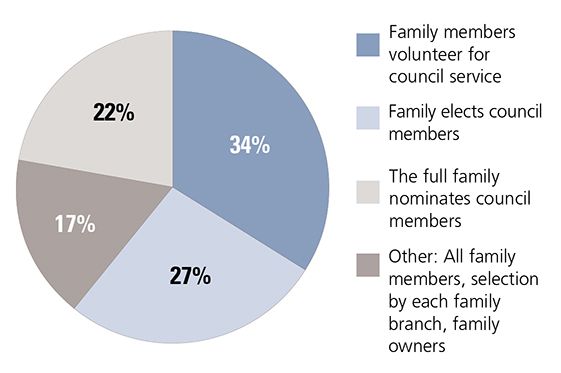
Here are some responses to this question:
• “Each family branch assigns two family members. Some are voted on and others assigned. We also appoint a member of the board of directors, which rotates.”
• “One family member from each of the original six families (of six brothers) serves on the council. The family member is chosen by the members of that individual family in a manner which that particular family decides. The family council is renewed on a yearly basis.”
• “Candidates have a prerequisite of having attended a particular family business governance seminar. Those qualified are identified by the current family council. The number of open slots and the number of people willing to serve has matched rather well so far. Members who have previously served can serve again if we do not have sufficient prospects who have never served. The current council would use its judgment on prioritizing which prospective members to invite first. The chair reaches out to the prospects and works her way down the list to fill the required number.”
Because organizing family activities is a lot of work, councils tend to meet frequently:
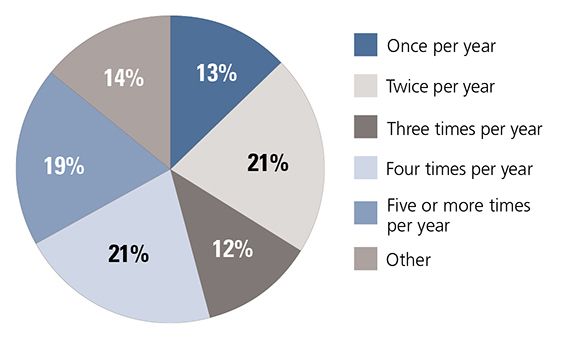
Many councils have some meetings by phone or online conferencing, and others in person. Other councils meet when issues or projects are pending. Larger councils delegate committees or task forces, which may include family members outside the council. For example, there may be committees focusing on philanthropy, next-generation education, planning the family assembly or managing family vacation properties.
Inclusion of in-laws. Many families take an inclusive approach to council membership. In our survey, 62% of families permit married-in family members to serve on the family council. By contrast, only 29% allow married-in family members to become owners of the family business.
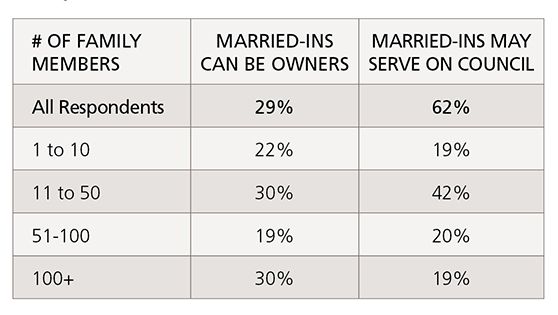
Budget
Families face the challenges of funding and compensation to ensure the council is effective. Families that recognize the value of family governance understand that they must allocate resources to make it successful. Larger and more dispersed families require higher family council and governance costs:
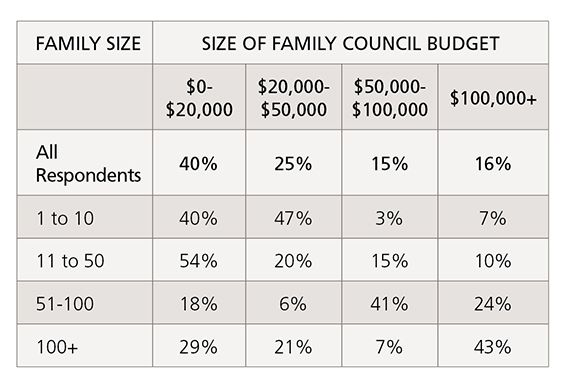
In the early years of a family council, the council chair is generally not compensated. But as the amount of labor involved becomes clear, the issue of value and fairness comes up. The council chair works for many hours on “family business,” taking away from family or work time. The chair then feels taken advantage of or expresses a desire to resign from the role. Families come to see that compensation is needed as an acknowledgment of the value they place on family governance and their respect for those who perform this work.
Of the 113 families in our sample, nearly a third (31%) compensate family council chairs. One-fifth pay up to $3,000 annually, 26% provide between $3,001 and $10,000 per year and 31% offer more than $10,000 in annual compensation. (One-fifth of respondents said they don't know how much the council chair is paid, and 3% said travel reimbursement is the only compensation offered.)
Most (77%) families reimburse council members for travel to council meetings. Some also compensate members who must miss work to attend a council meeting, and 38% report that they schedule meetings to avoid work conflicts.
Some also compensate council members. More than a quarter (28%) pay up to $3,000 per year, 12% provide between $3,001 and $10,000, and 10% pay more than $10,000.
The owners council
The complexities of a larger family can result in a desire to address issues related to ownership of the business in a forum that is separate from a family council (which deals with issues relevant to the broader family). The owners council provides a setting where shareholders can express their values, intentions and concerns with the goal of communicating with one voice to the business board. The forum is bi-directional: The board turns to the owners council when it needs direction from the shareholder base (for example, regarding risk tolerance) or when important information must be communicated to the family.
Of our 113 families, 28% have an owners council. Older family enterprises are more likely to have established this governance body:
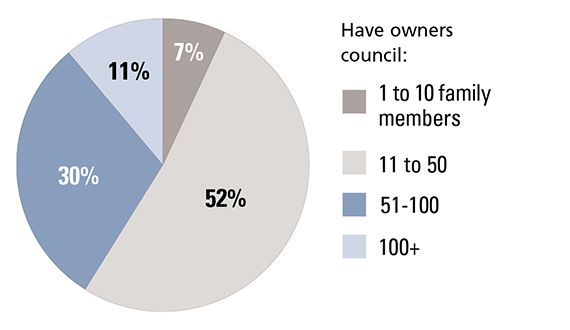
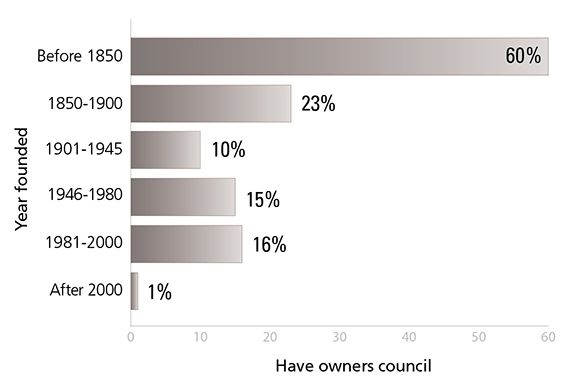

Family constitutions
A family constitution (also called a protocol or charter) is a document that codifies family governance. The constitution combines various policies and agreements into a single document that is subscribed to by all family members. When a person marries into the family or reaches a defined age (often anywhere from age 16 to age 25), they are asked to read and agree to the document.
Unlike a shareholder or operating agreement, a family constitution is not a legal document, although families consider it to be morally binding. Many constitutions include the values and mission of the family, its legacy and history, and details about how family assemblies, councils, foundations and ownership groups work.
The majority (61%) of survey respondents with a family council also have a family constitution. Of this group:
• 29% have had a constitution for more than 10 years
• 25% for six to 10 years
• 23% for two to five years
• 23% for less than two years
The family constitution is not a static entity. Most (71%) families with a constitution have had occasion to revise it.
We asked the families to describe the contents of their constitutions (see box on page 61). Their responses show that these documents are very diverse, containing many sections and considerable detail.
Final reflections
The practice of forming a family council and harnessing its power to benefit the family enterprise is fairly new. There are many models of how a council can serve as a tool for development of the family and support of the business, and for cultivation of the family's non-financial “capital.”
Families that have embraced family governance practices tend to be larger, and their enterprises older (beyond the 50-year anniversary). Financial support of the council leadership and funding for family meetings evolves as the “business of the family” grows in size and complexity and as the council matures.
The council and other family activities are described and codified in a family constitution. The constitution also documents the family values as well as policies and guidelines for family governance.
With a mature family council, an annual family assembly and a growing family comes the need to provide a conduit for clear communication between the shareholders and the board, which brings about the formation of an owners council. We see in the data an evolution of governance from organizing a first family meeting to launching an owners council.
We can make some inferences that financial support for governance, documentation of policies and separating shareholder responsibilities from broader family communication and development are steps families see as effective ways to manage the family enterprise. One of the key questions this survey raises is: How impactful and useful are these practices for families? The answer is found in families' behavior — in their efforts to learn together and provide opportunities for the personal and professional development of their rising generation family members; in their philanthropic activities and work to improve their communities; and, ultimately, in their ability to stay together as a family.
This survey offers a picture of how business families practice family governance. It will help a family that has a family council or wants to develop one to understand the terrain ahead and benchmark what they have done and what they might do as they develop. We invite families to share their learning and let us know what they are doing so that we can periodically update these findings and add to our knowledge of family governance.
DEFINITIONS
A glossary of terms used in this report.
Family assembly: A formal gathering of family members to discuss business and family issues. This meeting, usually held once or twice a year, is generally open to all members of the extended family.
Family constitution: A set of documents that record the family's values, hopes and goals as well as a framework for how to achieve them. The constitution provides guidance on the activities of the family, the business, the enterprise, the family office and more.
Family council: A formal governing body that represents the family. It makes decisions on issues that overlap the family and the business and makes recommendations on behalf of the family to the board.
Family enterprise: The various businesses and shared investments, including real estate, owned jointly by family members. A family usually begins with a single legacy business and then, over generations, diversifies into other investments, often selling their family business.
Family governance: Agreements and shared activities that organize the family to remain aligned in support of their values, ventures and investments through multiple generations.
Family office: A private wealth management advisory firm that serves ultra-high-net-worth families. A single-family office serves one family. Multifamily offices serve multiple families. Family offices can also manage non-financial issues, such as travel and household arrangements.
Owners council: Shareholders of the family business (or a representative group of shareholders) who meet to discuss their vision and goals for the enterprise and relay that information to the board with one voice.
TOPICS COVERED IN FAMILY EDUCATION PROGRAMS
Business Topics:
Branding, markets
Business operations
Business strategy: markets, SWOT analysis, risk, manufacturing
Compliance in digital era
Digital awareness
Entrepreneurship
Family and business history
Information about business operations
Meetings with executives of the family business
Talent management
Family Business Governance, Organization:
Buy-sell agreements
Board responsibilities and governance structure and responsibilities
Reading the annual financial report
Trust and estate education
Financial Topics:
Accounting
Financial well-being
Investing; asset classes; risk; environmental, social and
governance (ESG) issues
Reading and evaluating financial statements
Professional Skills Development:
Communication skills
Leadership development
Managing transition
Personal development
Philanthropy and social responsibility
SECTIONS INCLUDED IN FAMILY CONSTITUTIONS
Basic Principles/Values/Legacy:
Definition of family
Family history and legacy
Family philosophy
Founder's values
Shared values, mission and vision held by family and company or enterprises
Behavior/Responsibilities:
Code of conduct
Confidentiality
Social media policy
Use of family vacation property
Family Governance:
Family assembly
Family council
Council member elections
Chair tenure, mandate, term limits
Family roles and participation
Resolving disputes and conflict
Amending constitution
Financial Policies:
Dividend policy
Funds for family support
Entrepreneurship
Employment and other policies
Education policies
Personal loans
Next Generation:
Education policies
Information access
Next generation meetings
Philanthropy:
Governance
Mission
Wealth and Ownership Policies:
Board composition
Board director elections
Voter share restrictions, transfer, sale
Copyright 2020 by Family Business Magazine. This article may not be posted online or reproduced in any form, including photocopy, without permission from the publisher. For reprint information, contact bwenger@familybusinessmagazine.com.


